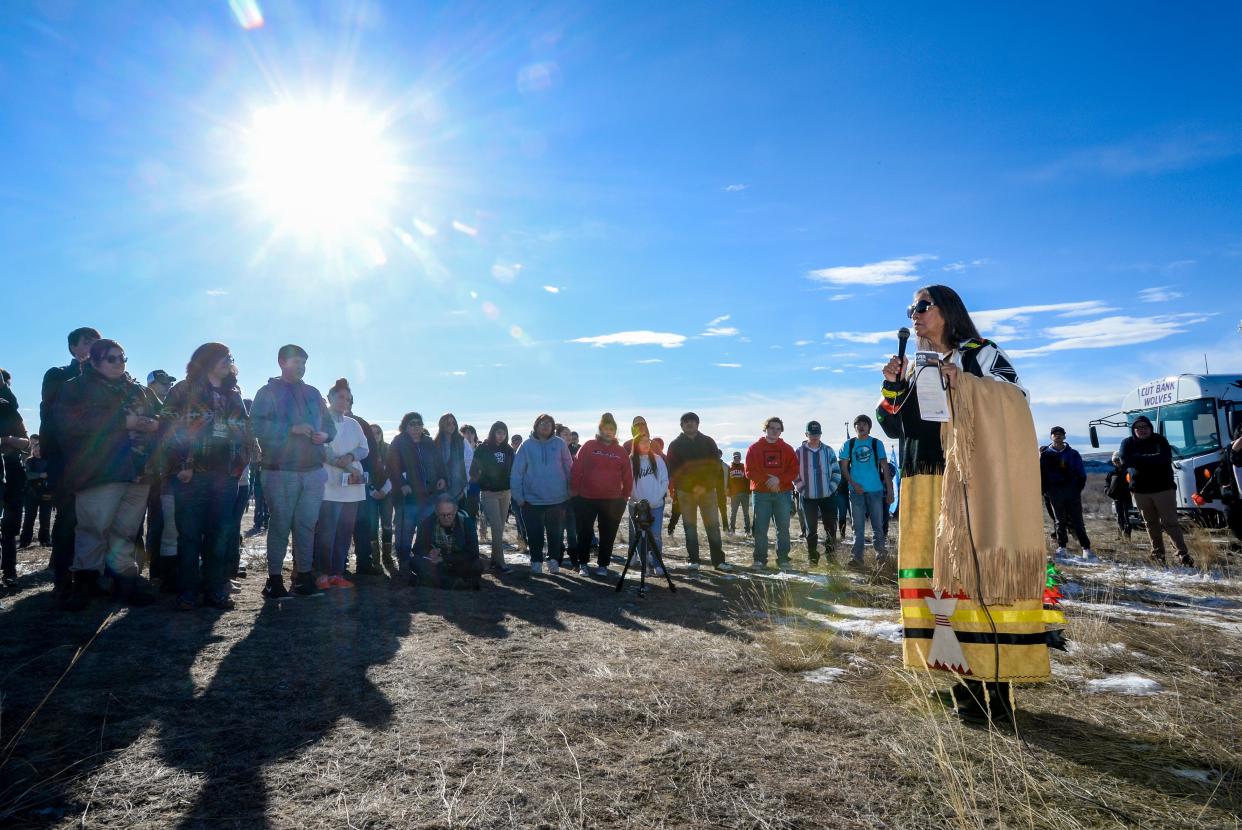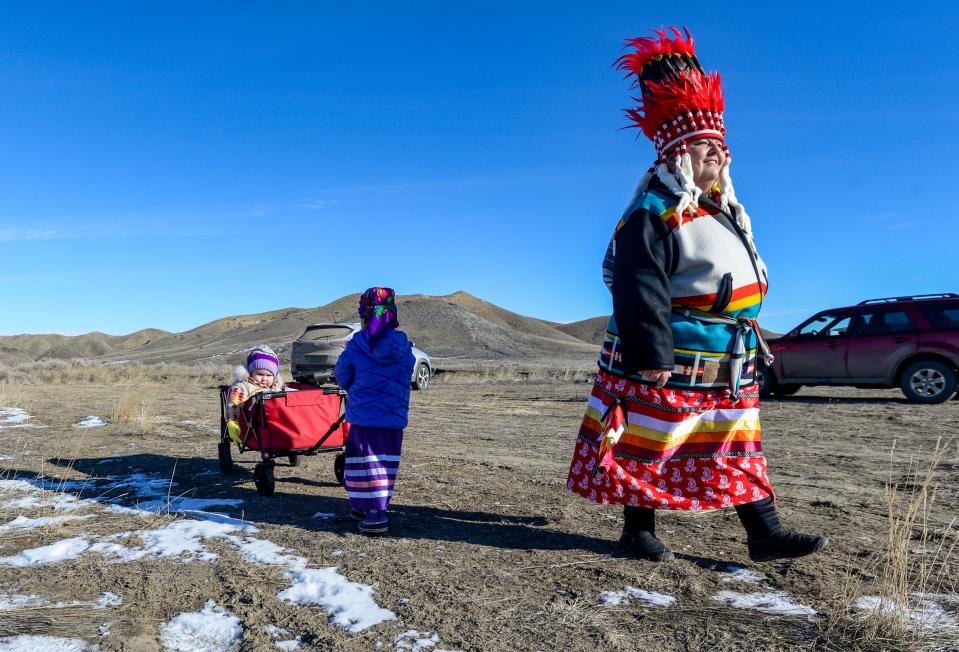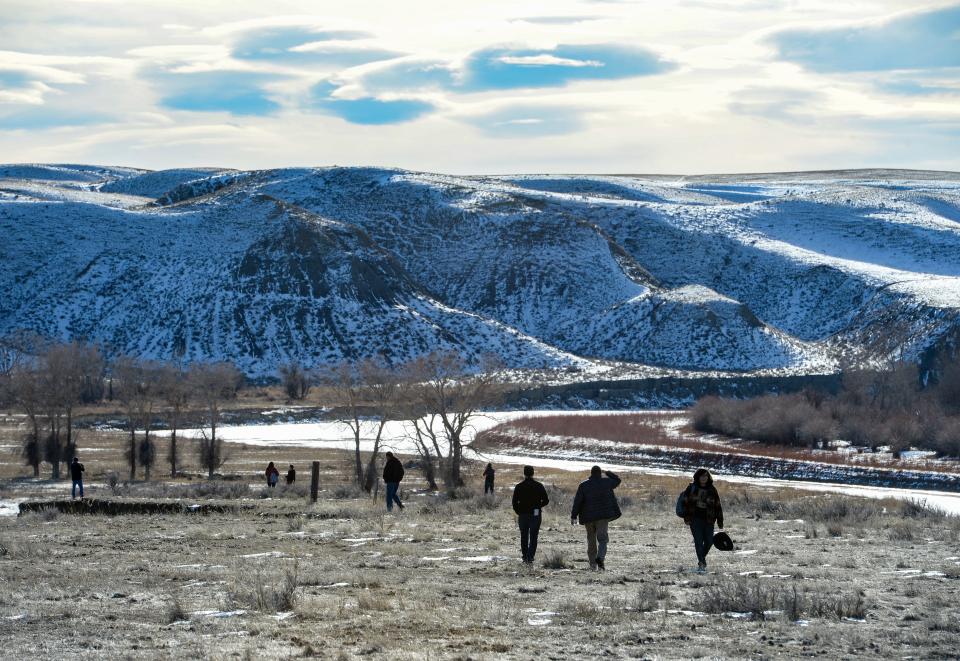Blackfeet tribal members reflect on the Baker Massacre

- Oops!Something went wrong.Please try again later.
Thanks for reading First Nations, the Great Falls Tribune's newsletter on tribal news. If you'd like to receive stories like this in your inbox, sign up for the free newsletter here.
Last Sunday marked 152 years since the Baker Massacre against the Blackfeet Nation.
On Jan. 23, 1870, the U.S. 2nd cavalry, led by Maj. Eugene Baker, attacked a peaceful Blackfeet camp, mostly consisting of women, children and smallpox victims, killing at least 173 Blackfeet people.
The brutal attack — also called the Bear River or Marias River Massacre — was critical in the invasion and conquest of Montana and marked the end of the Blackfeet's violent resistance against the U.S. government. Blackfeet family structures fractured as a result of the massacre, and the tribe suffered language and culture loss.

But too often, people in Montana — and elsewhere — haven't heard of the Baker Massacre. And because of the trauma and shame it caused, until recently, many Blackfeet people themselves hadn't learned about the event.
Iva Croff, who works at Blackfeet Community College, traces her ancestry to the massacre. Her family descends from Chief Heavy Runner, who was killed in the attack. And Joe Kipp, one of Baker's scouts, suffered guilt after the massacre and adopted several surviving children, including some of Croff's relatives.
"One thing we hear a lot is: 'That happened so long ago. How come you don't just get over it?'" Croff told the Tribune in 2020. “But it’s part of our DNA. What they went through affects us today. It’s our history, and we won’t quiet history. So we can’t just get over it.”
In honor of the 152nd anniversary, I asked Blackfeet tribal members for their thoughts on the massacre and what they wish other people knew about it.
Here's what they said. (Responses are edited for length and clarity).

Wendy Bremner, 52, Blackfeet and Little Shell: I first learned about the massacre as a college student at Blackfeet Community College, even though I was born, raised and educated on the Blackfeet Reservation. It fills me with sadness to think how it caused so much unnecessary grief and trauma for our people that has been passed through the generations. People were left orphaned and that made a huge impact on future generations as well. I feel reparations have not been made. There should be at least a cultural healing center dedicated to the memory of the innocent victims of this massacre, funded by the U.S. government. I wish people would learn our history, because it's their history, too. They need to understand how things happened to create conditions they see today as they drive through or visit our homelands.
Tara Walker Lyons, 33, Blackfeet: I learned about the massacre when I was about 25 years old. I was researching my genealogy and learned my great-great-great-grandfather, Calftail, was present and survived the massacre. When I first found out about this event, I felt betrayed by my own education because here I had the residual historical trauma in my own blood and nobody ever taught me about it. Reflecting on the massacre, I feel deep anger and sadness because most of the Blackfeet people at the camp were elderly, children, women and people suffering from smallpox. They were helpless. The men were out hunting, and when they came back to the encampment, their wives, mothers, parents and children were slaughtered. What kind of person could be so evil? I wish people knew that the descendants of those who survived the massacre live with historical trauma that is deeply embedded in our bodies and blood. Although the massacre happened 152 years ago, the trauma is still very much alive.
Kristen Janice First Rider, 55, Blood Tribe (Blackfoot Confederacy): I never learned about this stuff in history. Why? The U.S. and Canadian governments don't teach this in school because it makes them look bad. I believe the women and children were targets to stop procreation. When I think about the massacre, I think about how cold it was and how terrifying it must have been to be surrounded and shot down. The survivors had to see their dead family members, hear the cries of those injured and dying. It makes me ill. Part of my heart has died hurting for the ancestors that have perished. I want people to know that the government hid these atrocities because they knew they did Indigenous people wrong. So much has been lost; so much could have been learned from all those lost lives. So much knowledge and history were murdered. People need to know how beautiful Indigenous people are.
Rachel, 41, Blackfeet: I learned about the massacre when I was a student at Blackfeet Community College. Native history doesn't have the privilege white history has. White history takes precedence over Native history. When history is taught in schools, it focuses on the white peoples' version of events. When I think of the massacre, I think about all that was taken from the Blackfeet. I can't speak the language. Why? Because we are being gradually erased. It makes me angry.
Arthur "AJ" Weatherwax, 39, Blackfeet: I first learned about the massacre when my grandparents talked about losing family members to the attack. I remember going to the site to give tobacco for those innocent women and children that were killed. I feel fortunate to know my history. I'm well educated, as are many other Native Americans, and yet the media does not portray that. Every year around this time, I feel sad for the innocent band that was massacred. I also feel proud to be Blackfeet and still here after my tribe faced murder, rape and genocide. I wish that our Native history was told truthfully by historians with a Native background.
David Wilson, 65, Blackfeet: I learned about the massacre from my mom. I wish people who lived in Montana would know the state's history. I lost a lot of family members at the massacre.
Annie Black, 51, Blackfeet and Cherokee: Thinking of the massacre makes me sick, sad and angry. I think about the loss on all levels. Everyone needs to know about the invasion of tribal lands everywhere.
Raquel, 51, Blackfeet: (Reflecting on the massacre) makes me feel angry and frustrated. It was a very hard time on my people.
Abaki Beck, 28, Blackfeet and Metis: I have known about the Baker Massacre my entire life. Growing up, my mom was very intentional about teaching my sister and me about Blackfeet history and our family's history. I think people don't learn about the massacre because it makes white people uncomfortable. White people don't like learning about racism, colonialism and violence that they perpetrated. This isn't just an issue in Montana. Across the nation, states and school districts are trying to ban books on the history of people of color. If we don't learn about events like the Baker Massacre, we aren't fully learning American history. We're learning white American history.
Thank you to those who shared their thoughts for this story. You can read more about the Baker Massacre here.
This week in the news ...
Chris La Tray, member of the Little Shell Tribe of Chippewa Indians of Montana, speaks on 1A about offensive place names in America.
Playing pretendian
'Survival mode' in Lame Deer
Nora Mabie
Indigenous Communities Reporter, nmabie@greatfallstribune.com
If you'd like to see this sort of thing in your inbox every Friday, subscribe to this newsletter! You can also support my work by sharing this newsletter with friends or by subscribing to the Great Falls Tribune.
This article originally appeared on Great Falls Tribune: Blackfeet tribal members reflect on the Baker Massacre

